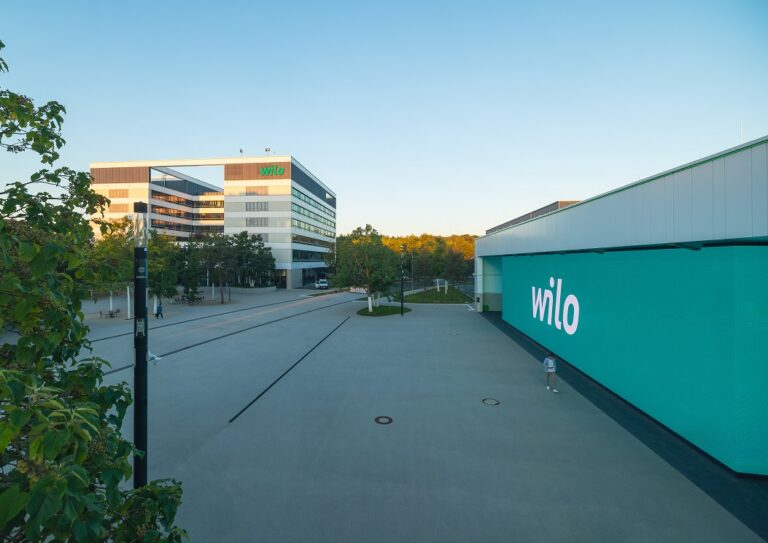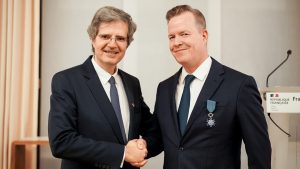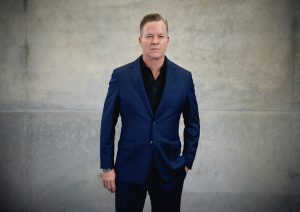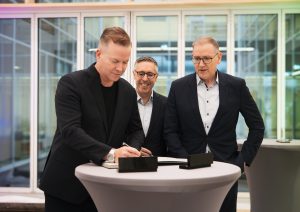Wilo Group Secures Sustainable Growth through Historic Transformation

The Wilopark in Dortmund. (Image source: WILO SE)
“We are in the midst of a geo-economic turning point as a direct result of the geopolitical turning point. Europe is the loser in this readjustment of global value chains. Growth is shifting to other regions of the world, particularly the Global South,” explains Oliver Hermes, President & CEO of the Wilo Group. This development is particularly striking in Germany. “Germany is experiencing rampant deindustrialisation. This is also reflected in the highly volatile heating markets.”
Although, the weak demand for heat pumps and other heating systems is primarily due to the protracted political debate surrounding the Energy Efficiency in Buildings Act and the resulting loss of confidence among consumers, “we can no longer talk about a temporary effect. The continuing crisis in the German heating market points to structural shortcomings and inadequate underlying conditions. The weak heating market is an example of Germany’s weak growth,” Hermes continues.
For years, the Wilo Group has been preparing for the consequences of the geo-economic turning point with its region-for-region approach. The aim is to satisfy regional customer needs with regionally manufactured products, systems and solutions. “Consistent implementation has enabled us to evolve strategically towards greater flexibility, resilience and customer proximity,” explains Hermes. Up to now, however, the strategy has focussed in particular on procurement, production and customer-related processes. “Now we’re taking the next logical step.”
As part of a large-scale project, the Wilo Group is regionalising its entire organisational structure. Three decentralised regional organisations – Wilo Europe, Wilo AMEA (Asia, Middle East, Africa) and Wilo Americas – will now assume much greater responsibility in areas that were previously managed primarily by the central departments at the Group headquarters in Dortmund. In addition, three locations have been earmarked as regional headquarters: Wilo Europe will be managed from Dortmund, Wilo AMEA from Dubai and Wilo Americas from Cedarburg. The Wilopark in Dortmund will remain the Wilo Group’s overall, central headquarters. The business activities will be conducted by regional Executive Board teams, which will continue to report to the Wilo Group’s central Executive Board:
Wilo Europe:
- Peter Glauner, Regional Chief Executive Officer & Regional Chief Sales Officer
- Ünal Görgün, Regional Chief Financial Officer
- Michael Ranft, Regional Chief Technology Officer
Wilo AMEA:
- Jens Dallendörfer, Regional Chief Executive Officer & Regional Chief Sales Officer
- Altug Arkaya, Regional Chief Financial Officer
- Hans Keeris, Regional Chief Technology Officer
Wilo Americas:
- Jeff Plaster, Regional Chief Executive Officer
- Dan Raymond, Regional Chief Financial Officer
- Svenja Ahlburg, Regional Chief Sales Officer
- Zeki Oral, Regional Chief Technology Officer
Due to the decline in Europe as an industrial location as a result of the geo-economic turning point and the consistent implementation of the region-for-region strategy, Wilo is currently comprehensively analysing the personnel structures at its European locations, including the Wilo Group’s Dortmund headquarters. The aim is to significantly increase the organisation’s efficiency without having to make redundancies, but also to enable the strategic further development of the Wilo Group.
As a result of this analysis, selected employees are currently being proactively offered the opportunity to leave the company. For Wilo, as a socially responsible employer, the focus is not least on attractive offers for early retirement.
“Wilo’s strategic reorganisation is more than just a reaction to the geo-economic turning point. We’re increasing efficiency as well as focusing on the entire organisation’s market and customer-oriented approach. This will ensure the Wilo Group’s profitable growth in the long term,” explains Wilo CEO Oliver Hermes. Markus Teepe, Chairman of the WILO SE Works Council, adds: “We’re convinced that this transformation is strategically necessary. The WILO SE Works Council supports the regionalisation project and firmly believes in the success of the new, more efficient organisational structure.
Even if the ongoing transformation primarily affects the Group headquarters in Dortmund, the future of the site is not up for debate for Wilo,” emphasises Oliver Hermes. The Group has invested a total of around 400 million euros in the ultra-modern Wilopark. “This has enabled us to skilfully overcome the main disadvantages of Germany as an industrial location – too much red tape, high energy costs and a shortage of skilled labour. The Dortmund site is well equipped for the future.”
Source: WILO SE







